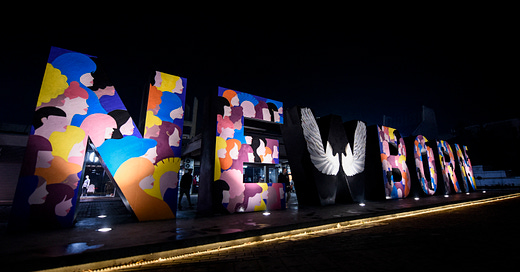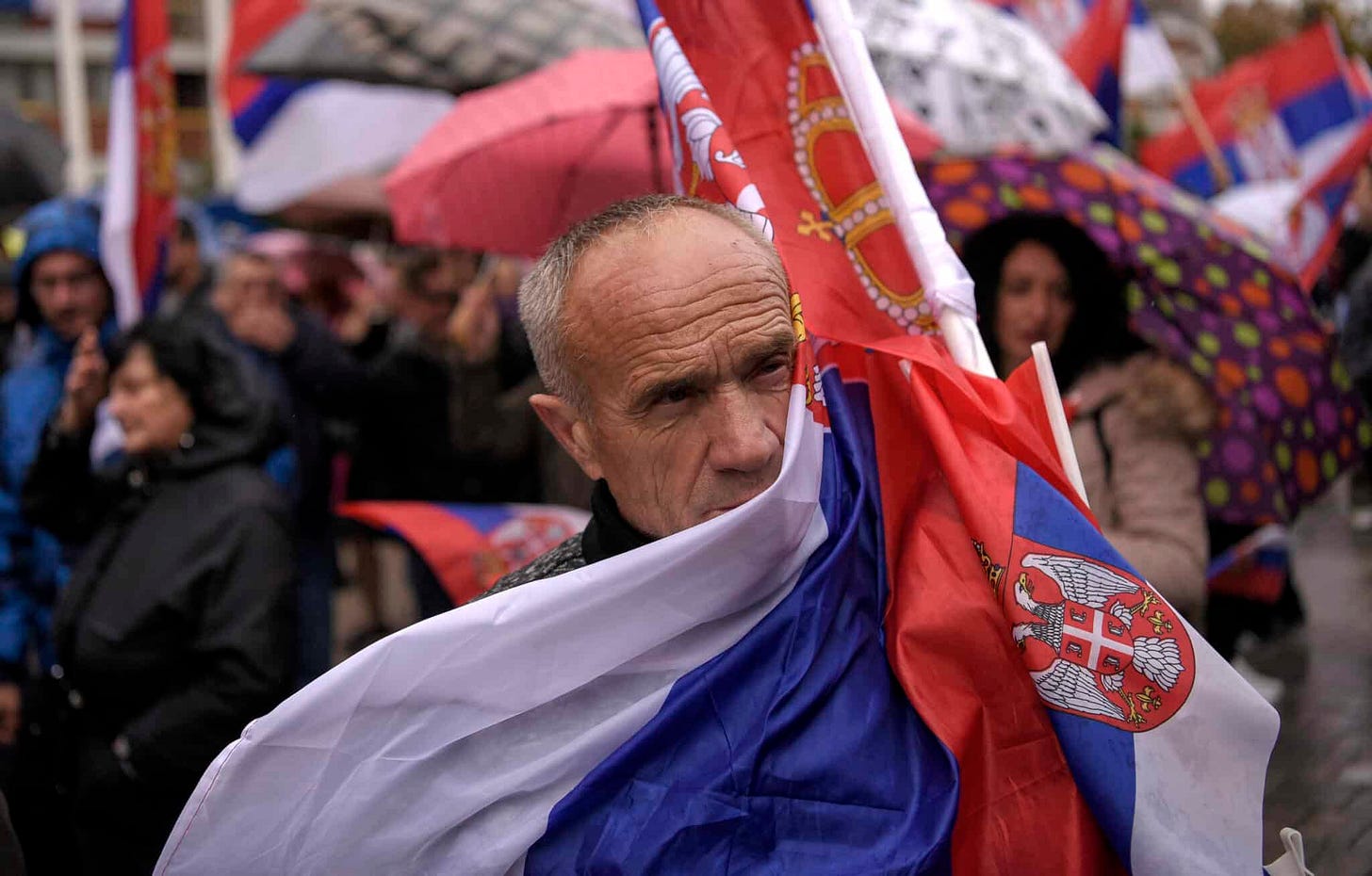S4E5. We have to talk about Kosovo and Serbia. With Drake
The Canadian rapper included a reference to the recent tensions between the two Balkan countries in his latest song 'Polar Opposites'. How critical is the situation to reach this level of mainstream?
Hi,
welcome back to BarBalkans, the newsletter (and website) with blurred boundaries.
“Don’t know how they do things in Prishtina
I just know the tension is increasing”
How can a reference to Prishtina, the capital of Kosovo, be included in the latest song by the Canadian rapper Drake?
Even though this is only one bar in Polar Opposites - which deals with an entirely different theme - it is significant that one of the most influential figures in contemporary music scene has chosen Kosovo to give a measure of the tension he talks about in the song.
We do not know if Drake is fully aware of what is happening between Kosovo and Serbia and why the escalation of violence since May is becoming increasingly alarming.
Unless he decides to respond directly to this newsletter.
In any case, two and a half years later our last analysis (with many accurate predictions), it is time to take stock of the situation. As always, to understand why everything that is happening in the Balkan region affects us so closely.
A year of pure madness
Let’s start from the end, from the most recent events that raised international concern about the situation between Serbia and Kosovo.
The key date is September 24, when a terrorist attack occurred near the Serbian Orthodox monastery in Banjska, in Northern Kosovo.
After reports of an illegal barricade on the border with Serbia, Kosovo Police was attacked by some 30 armed people. One police officer died and two were wounded. Then, the group entered the monastery complex and clashes continued throughout the day. Three terrorists were killed during the clearing operation by the Kosovo Police.
However, developments in the following days painted a much more serious picture than expected, with clear ramifications in neighboring Serbia.
As shown by a video shot by a drone, Milan Radoičić was among the attackers outside the monastery. He is the deputy head of Lista Srpska, the main party representing ethnic Serbs in Kosovo, closely controlled by the President of Serbia, Aleksandar Vučić.
While Kosovo police found out a huge arsenal of weapons at the terrorists’ disposal, Radoičić himself confirmed that he led the attack, raising many concerns about the ability of the Serbian establishment to interfere in Prishtina internal affairs, even in violent ways.

Relations between Kosovo and Serbia collapsed on September 30, when the United States warned of «a large Serbian military deployment» along the administrative border with «unprecedented staging of advanced Serbian artillery, tanks, and mechanized infantry units».
Brussels warned Belgrade to withdraw the troops, while the UK sent a contingent to reinforce the Kosovo Force (KFOR), the NATO-led international peacekeeping force that now counts 4,811 international soldiers.
The Prime Minister of Kosovo, Albin Kurti, complained that the attack was part of a larger plan to annex Northern Kosovo «through a coordinated attack on 37 different positions». It would be followed by the creation of a corridor to Serbia, «to allow the supply of weapons and troops», he stated.
However, it seems more likely that Serbia wanted to threaten an attack to indirectly force KFOR to take control of public order in Northern Kosovo. In this way, both disempowering the Kosovo Police and preventing Prishtina from exercising full sovereignty over the territory claimed after the declaration of independence in 2008.
A clash with NATO would represent political suicide for Vučić - ahead of early elections on December 17 - and for his international credibility. Even if supported by Russia, Serbia could not sustain international isolation, either militarily or economically.

All considered, 2023 is the most difficult year on the diplomatic level and the most violent on the ground. The first point of no return was on May 26, when extremely violent protests broke out after the inauguration of the newly elected mayors of Zubin Potok, Zvečan, Leposavić, and Kosovska Mitrovica.
The most extremist members of ethnic Serbs in the north of the country soon turned the protests into guerrilla warfare. It also involved KFOR international soldiers.
The tension was triggered by Kosovar government’s decision to send special police forces to allow mayors elected on April 23 to enter town halls. The turnout of this election was almost negligible - around 3% - because of Lista Srpska’s boycott.
Two weeks later, on June 14, an arrest/kidnapping of three Kosovar police officers by Serbian security services put the governments in Prishtina and Belgrade against each other.
The three police officers were released only on June 22. After a summer of hopes for a return to normality, the attack on Kosovo Police in the north of the country brought tensions back to unprecedented levels.

Where all this tension comes from
Trying to make order in the tensions between Serbia and Kosovo is like dealing with dominoes. For each domino fallen, we have to go back to the previous one. And back again, and again. This is why we need to start from two years ago (2008 would be too much for a single newsletter).
Following Kurti’s victory in February 2021 elections, the so-called ‘car plates dispute’ in Northern Kosovo broke out for the very first time in mid-September. It started as a diplomatic dispute between authorities in Prishtina and Belgrade, because of Kosovar government’s decision to change license plates on Serbian vehicles entering Kosovo, which are largely used by ethnic Serbs in the country.
The absence of a final solution caused the escalation in the second half of 2022. At the end of the provisional agreement, the first roadblocks and barricades appeared in late July.
The situation worsened when Lista Sprska took over the reins of the popular protest in Northern Kosovo against the plan for the implementation of rules on the replacement of Serbian car plates.
Mass resignations of mayors, councilors, parliamentarians, judges, prosecutors, judicial personnel and police officers took place on November 5. Including the mayors of Kosovska Mitrovica, Zubin Potok, Zvečan, and Leposavić, who forced the return to the polls. Originally scheduled for December 18, the election was postponed to April 23.
Although a compromise solution on car plates was found on the night between November 23 and 24 in Brussels, President Vučić threatened to boycott the EU-Western Balkans Summit in Tirana on December 6 because of internal issues in Prishtina.
In particular, because of Nenad Rašić’ appointment as Minister for Communities and Return in the government of Kosovo, replacing resigning Goran Rakić, leader of Lista Srpska. Rašić is the founder of the Progressive Democratic Party, an ethnic Serb political party hostile to Belgrade and competitor of Lista Srpska.
The year 2022 ended with a new escalation of tension at border crossings in Northern Kosovo, after the replacement of several hundred police officers who resigned in November. The barricades were dismantled some weeks later.
Read also: XL. A kick to diplomacy
What is the EU doing?
The European Union is struggling. And probably it could not be otherwise, considering its role as mediator between Serbia and Kosovo.
The common opinion in Brussels is that «there is a need to reflect on the EU policy towards both Serbia and Kosovo», after condemning both the attack in Northern Kosovo and the military buildup at the border.
The most urgent issue concerns the possibility of imposing temporary measures (not sanctions) against Serbia, even if it is almost impossible because of the opposition of Viktor Orbán’s Hungary.
This would be the same decision taken against the other party to the Belgrade-Pristina Dialogue after the violence in late May. Now, we are forced to take a step back.
In mid-June an emergency meeting was convened in Brussels with Kurti and Vučić to get out of the crisis. However, considering the failure to take a «constructive attitude» toward de-escalation, the EU imposed «temporary and reversible» measures against Kosovo.
To lift these measures, authorities in Brussels and in Prishtina agreed in July a four-step roadmap for the de-escalation, which Pristina is implementing with difficulty. This roadmap is expected to lead to new local elections.
The latest high-level meeting of the Belgrade-Pristina Dialogue on September 14 highlighted once again the unresolved heart of the issue: the Association of Serb-majority Municipalities in Kosovo.
Ten years after the Brussels Agreement, the implementation of the community with high administrative autonomy in Northern Kosovo is still far away.
Read also: S3E18. What if this is Kosovo’s Golden Year?
It is precisely on the diplomatic ground that the EU is playing all its cards (and its international credibility), in a Dialogue that is more than 10 years old.
Before the escalation of tension between May and September, the situation seemed to be on the right track. On February 27, the Brussels Agreement defined the commitments by Serbia and Kosovo for the normalization of mutual relations.
This is an 11-point proposal of great value, in particular for the implicit commitments: the recognition of Kosovo as a sovereign State and the establishment of the Association of Serb-majority Municipalities in the country.
The text was not signed, but it was made binding by the Implementation Annex to the Agreement reached in Ohrid (North Macedonia) on March 18. The major financial consequences in case of noncompliance by one or both parties seemed to be a good deterrent for second thoughts.
The Declaration on Missing Persons was the first article implemented, followed by the announcement on the Joint Monitoring Committee to supervise implementation of the Agreement and by the draft on the Association of Serb-majority Municipalities in Kosovo.
Six months later, it seems to be back to square one. With the background of a song by Drake, saying: “Don’t know how they do things in Prishtina, I just know the tension is increasing”.
Read also: S3E7. The youthful energy of Prishtina
Pit stop. Sittin’ at the BarBalkans
We have reached the end of this piece of road.
There is one more thing that we have to talk about today. As it happens sometimes in this journey, our bar, the BarBalkans, turns into an agenda of the most important events not to be missed.
This is the case of a long-awaited event with a special guest, who opened the fourth season of this newsletter and who will come to Brussels for an in-person conversation.
On Saturday 25 November, in Brussels, the Italian bookstore and wine shop PiolaLibri will host BarBalkans’ new event (for Italian speakers) “Volevo essere Madame Bovary. Dialogo con Anilda Ibrahimi”.
It will be an opportunity to meet the Albanian writer deeply rooted in Italy and author of Italian novels focused on the history, culture and society of Albania over the last century. Her latest novel, Volevo essere Madame Bovary, will be the starting point for our dialogue.
The conversation will be followed by a live dj set by DJ Zwalla (HAPE Collective).
Read also: S4E1. Anilda Ibrahimi. Overcoming limits
Click here to read more:
Let’s continue BarBalkans journey. We will meet again in two weeks, for the 6th stop of this season.
A big hug and have a good journey!
If you have a proposal for a Balkan-themed article, interview or report, please send it to redazione@barbalcani.eu. External original contributions will be published every last Friday of the month in BarBalkans - Open bar section.
Your support is essential to realize all that you have read. And to keep BarBalkans newsletter free for everyone.
An independent project like this cannot survive without the support of the readers. For this reason I kindly ask you to consider the possibility of donating:
Every second Wednesday of the month you will receive a monthly article-podcast on the Yugoslav Wars, to find out what was happening in the Balkans - right in that month - 30 years ago.
You can listen to the preview of BarBalkans - Podcast on Spreaker and Spotify.






